- Home
- Elizabeth Knox
Billie's Kiss Page 7
Billie's Kiss Read online
Page 7
They were silent a while. The mist was turning dilute in the blue sky, only a smear against higher, sunlit clouds, clouds with some architecture, as imposing as the public buildings of Empire. ‘He got a peerage on top of his knighthood,’ said Tannoy. ‘Four years ago. And he added the “Hulme” to his name. He was a grocer, then an inventor, now he’s a philanthropist – a great man, really.’ Mr Tannoy glanced at Geordie. ‘I do admire him. And he’s bought that island in order to give it back to the crofters. And to start a few industries, to make work for all.’
‘But?’ said Geordie, amused, despite his trembling hands, heavy eyes, sour stomach. Despite the view he had.
‘But nothing, Betler.’ Tannoy blushed again – that is, his complexion went an orange shade. ‘I approve.’
‘My brother disliked him,’ said Geordie. ‘Ian was very attached to Mr Hesketh.’
They watched a procession of three empty coffins carried, lightly, up the angled gangplank to the steamer’s deck. ‘Will they stow them there in the weather and in plain sight?’ Geordie said, exasperated.
In the breeze the blind’s tassel tapped and tapped on the sill of the carriage window.
‘So – did your brother feel he had to choose between them?’ Andrew Tannoy asked.
‘Hallowhulme and Hesketh? No. Lord Hallowhulme paid Mr Hesketh’s debts. Or bought them. They’re cousins. So is Lady Hallowhulme a cousin. All cousins. Clara and Murdo Hesketh twice over, since both their fathers and their mothers were siblings. The two Hesketh brothers, Lars and Duncan, married two Vega sisters – white-haired Swedish lasses, the daughters of a baron. Lars and Duncan’s sister Mary, the eldest Hesketh, married a grocer from Durham, Edward Hallow. They are all very near kin. But – you see – Mr Hesketh liked his independence.’
‘Fellows who value their independence are usually more careful with money,’ said Andrew Tannoy. ‘They don’t gamble and think God will make an exception of them.’
Geordie looked hard at his employer. Why, he asked, did Mr Tannoy think it was gambling?
‘I’m fishing, Betler. Angling. I had heard Murdo Hesketh was ruined.’
The coffins had gone below, after all. The undertakers came back down the gangplank, showed for a minute like black cormorants against the sparkling water.
‘It was more misfortune than mismanagement.’ Geordie confided that much. He said, ‘I must be off, Mr Tannoy.’
Andrew Tannoy nodded. They both got out, and Mr Tannoy put up his arms to take Geordie’s bag from the coachman. ‘If we can be of any help at all,’ he said, speaking for his wife, as well as himself. He handed Geordie his bag.
The ship’s whistle sounded. Two boys running past stopped dead, covered their ears, and joined the whistle, screamed along with it.
‘That’s enough now!’ roared Tannoy. The boys looked at his frown, startled, speculative, then went on running. Tannoy’s scowl deepened. He looked at his butler, and said, ‘You mustn’t be offended if I attempt to press a few pounds on you, a little extra for the unexpected. You don’t want to put a hole in your savings.’
Ian’s grave. A hole in his savings.
Geordie took the purse; he took it to be kind. Both men shuffled, looked awkward. And then Meela Tannoy appeared, breathless from running, the two layers of amber silk blown back from her white hair. The footman was puffing and blowing in her wake. She took Geordie’s hands and said, ‘Please take care. Be as long as you need, but please let us know how you are.’ She squeezed his hands.
Geordie boarded the ship for the fifteen-hour trip from Oban to Stolnsay.
MISFORTUNE, NOT mismanagement. A bad investment, a court case, an illness, two funerals. One thing on top of another. A big rock balanced on a cliff top.
The ship was in the Minch, its open water, the voyage half-gone, the sun going. It was a white evening, white and gold, white and rose, the sky an expanse of godly flesh, its white solid and warm. Geordie hooked his arm over the rail and looked down into the water in time to see a seal surface, its sleek head turned to look at the looming side of the ship whose engines were a discomfort that flushed it out from the waves and its pursuit of fish. It was a fur seal, not a sea lion, small, and soon lost again to Geordie’s eyes. How delightful it was, Geordie thought, just to look down and chance to see something alive in the water.
Ian had been, by profession, an officer’s orderly. The first man he worked for, a major in the Black Watch, had, on his retirement, recommended Ian to a friend of the family. Ian had wanted to travel. Murdo Hesketh, whose mother was Swedish, was a captain in the household cavalry of King Oskar. Ian did have some trouble learning a new language, but there was quite a group of ‘Scottish Norsemen’ in the household, and he took an instant liking to Captain Hesketh, a charming, clever but reckless young man. They had their adventures – the excesses and hard play of bored men in barracks, the fierce games, the pranks, intrigues, romantic diversions. They went about the countryside on royal warrants and travelled with the young princes to Russia and Denmark, Holland and Norway.
Ian was, with people, as a keen reader is with books – he lived on his observations, he took everything in, he enjoyed the life around him as the audience of fiction will the play of character. Gossip wasn’t quite the right word for what Ian did, because he seemed to need to share his observations only with his elder brother.
Ian and his employer had five good years, then Murdo Hesketh gave up the army and began to look around for some unstrenuous and gentlemanly occupation. He had money, a modest inheritance, and the pay he’d saved. He stayed in Stockholm – where he had some hopes of a young lady. Besides, his sister was there, his younger sister, Ingrid, and her husband, Karl, who was a friend of his.
This is what Geordie knew. What Ian had told.
It was this Karl Borg who persuaded Murdo to invest money. It wasn’t Borg’s own financial venture, but that of a friend, a man in whom Karl had complete confidence. The business had, Ian said to Geordie, looked sound on paper. He had even thought to put a little capital in for himself, but he had so little, and looking at the figures – no huge profits were promised – it didn’t seem worth the paperwork, or the worry. Ian did worry, he didn’t quite know why, but wrote later to his brother that, on meeting ‘the man’, he had found himself unable to read him. ‘He was like a certain kind of clergyman. A man with a very clear conscience. His brow was utterly unmarked by lines – odd in a man of forty. It was as if he had never bunched his brow muscles, had never been moved to frown, had never lifted his eyebrows in surprise at the world. When I say I couldn’t read him, Geordie, I was looking for lines, as one looks for the story under the headlines in a newspaper.’
Murdo and Karl lost their money. Had it lost for them. Ingrid was with child, so Karl resolved to protect her from knowledge, to hide his distress. Murdo let Ian go, and moved to small rooms, while Karl kept up a silly pretence of solvency for a few more weeks. Ian wrote, ‘Borg seemed more afraid of being shamed in his wife’s eyes than of sin or bodily danger.’ Then, on the morning men came to remove the Borgs’ furniture to pay their creditors, Karl walked out. He walked past the carriers, the bailiffs, Ingrid and her grey silk gown, stippled lines showing all along its seams where she’d had it let out. Karl went to the place his friend had gone when he fled arrest – Karl knew where to find him. They met, there was an argument, and Karl drew a gun from his coat pocket and shot his friend. Shot and killed.
Ian read about the murder while sitting in the tearooms of a station in Copenhagen, waiting for train to Brussels – and, eventually, a boat to Dover. Ian did what a friend should, folded his paper, paid for his tea, cashed in his ticket, and went to find his former master.
Murdo Hesketh was living in two dim rooms up three flights of stairs in a street within the invisible noisome capsule of a new tannery, where a block of fine old residences had become one of neglected boarding establishments. Ian walked up to the house through the unmown grass and sat on the steps to bash the paste of mashed b
rowned birch leaves from the soles of his shoes, then knocked. He was shown up, hat in hand, by the landlady. Murdo was waiting on the landing. He said, ‘Oh – Ian. I thought it was the post.’ His voice was dull.
Murdo’s sister had shrunk around the determined swelling of the child. She asked Ian to sit, but didn’t say anything further.
Murdo talked. He’d been writing letters to anyone who might help. He glanced at his sister. ‘We’ve had advice,’ he said. ‘About the whole matter of the money – any number of people could come forward to shed light on all that. And, of course, we have testimonies as to Karl’s character.’ He jumped up, fetched a stack of letters and winnowed them – let them flutter down into Ian’s lap.
Murdo looked again at his sister, who only gazed at the uneven mended edge of the hearth rug, the floor there glossy with wear and ingrained soot.
‘My cousin Clara’s godfather, Peter Tegner, the judge, is coming from Malmo to attend the trial,’ Murdo added. ‘We expect him shortly.’
Ian’s paper had said that the trial was set for the beginning of the following month. Ian looked at Murdo’s sister in her corner, against a stack of shelves, almost empty, but still bowed down by the memory of books. The corner looked blurred and distorted – Ingrid, too, like an oil painting prematurely faded, one that has lost the red pigment which lends life to painted flesh.
Ian suggested that Mr Hesketh might like to consider taking his sister somewhere quieter, more salubrious, with fewer flights of steps. Murdo stared. He said they must remain in town for the trial. Murdo said he had thought Ian gone already, then, ‘When do you travel?’
Ian said he had a few things to do before he left. He asked could he call again? Then he saw himself out.
Over the next few weeks Ian would go to that street and watch the boardinghouse door till Murdo departed, then he’d visit Ingrid, let her make him tea, and share the bread, or bacon, or cheese or apples he’d brought. He played the part of a good guest, someone who wouldn’t arrive empty-handed. He didn’t insult Mr Hesketh and his sister, never came carrying ingredients – eggs, or a joint of meat, or vegetables – nothing that needed preparation. He’d eat some of what he bought, would come with his appetite as well as his donation, and play at conviviality. Then the trial commenced, and Murdo and his sister were at the courthouse every day.
Once during the trial Ian saw Murdo meet with the young lady of whom he’d had some hopes. She was waiting outside the courtroom, her brother in escort. She stepped up to Murdo and unveiled her face, her brother tipped his hat, then turned his gaze. She and Murdo spoke briefly – he once raising his voice so Ian overheard, ‘… in that case, I’d like my letters back.’ She began to weep, replaced the veil, and stood for a time, handkerchief inserted between veil and face, dabbing, dabbing. Her shoulders shook. Then she let her brother lead her away.
Karl Borg was found guilty and condemned. ‘The guillotine,’ Ian wrote to Geordie. ‘They have it here, although one tends only to associate that contraption with the French.’ It was only after the sentencing, when pity made him indelicate, that Ian asked his former employer how he could help. ‘I almost begged him to be able to. And he only looked at me with that look he has, like blue light leaking out from under ice.’ (Ian had once slipped through two cracked and tilting plates of pack ice and gone under in Kalmar Sound. Murdo saved him. As Ian told it he came back to consciousness, bundled up in a stranger’s travel rug, still on the shore, being scorched in places by several hot bricks in leather-lined velvet bags. The rug and bricks had been donated by a matron and her five pink-nosed daughters, who stood lined up like fence palings along the road, beside their sleigh. Murdo was draped in a horse blanket. He had his shirt off and his skin was so rosy he looked boiled. ‘He was steaming, as if he’d just stepped out of a sauna,’ wrote Ian. He was looking, Geordie supposed, with eyes that didn’t seem able to show concern or warmth – only alertness.)
Perhaps a week after his offer of help, Ian had what he referred to as ‘a moment of inattention’. He’d had certain things fixed in his sights: the day the sentence would be carried out, and after that, the week around which Ingrid Borg’s child was due. Her time. Her husband’s time. One afternoon Ian arrived at the boardinghouse with a packet of pears and cheese. The landlady bustled out of her room when he was halfway up the first flight and said that the young lady had been taken to hospital. She had begun to bleed.
Ian reached the ward only an hour after the end, when Ingrid Borg’s face was covered, but before she was moved and the bloody sheets were stripped from the bed. Murdo was in the curtained cubicle, on a chair by her bed, his elbows on his knees and hands in his hair. His cuffs were blood-soaked, and his hands stained, and still tacky – so that, when he raised his face to stare at Ian his hair caught in the blood and came free in a fidgety, staggered fashion, some locks standing out from his head in clotted points.
Murdo said to Ian, hoarse and hesitant, ‘It won’t sink in. She was unwell yesterday, and I fetched a doctor instantly. She gave me her ring to pawn. I sent the doctor up to her, and ran around the corner to pawn her ring. I paid him – but he didn’t see far enough ahead to save her.’
Murdo lifted the covers to show Ian Ingrid’s left hand, bloody and white, with a whiter circle of tender, shiny skin where the ring had been. Then, to Ian’s horror and pity, his former master raised the covers further to share what was burning in him, burning like a new sun into the orbit of which everything former now had fallen. Murdo pried open a towelling parcel that lay in his sister’s bloodied lap, and there was the baby, all mousy down and soft fat – dewy, pliable, motionless.
Ian wrote: ‘I couldn’t do much more than shake my head. I wasn’t uncomfortable, in that tent of sheets he’d made inside the tent of bed screen, it was peaceful in a way. And I was relieved to think that he would now let me offer some assistance, that I wouldn’t have any more trouble for a time with his pride.’
Ian took over, tended to his master – redeemed Ingrid’s wedding ring and Murdo’s watch. He paid the landlady’s bills, the week’s rent Mr Hesketh owed, and for the replacement of a bloodied mattress. Ian rented another room, along the hall from his, and went with Murdo about his business. They buried Ingrid. They visited Karl and dissembled.
Ian was with Murdo on Karl Borg’s last day. They were not permitted a visit on his final night – which he spent with two jailers and a minister in a small snug room right beside the courtyard and its contraption, under which the bare ground showed a light snowfall of quicklime. On that last day Karl seemed to have become hard of hearing. He shook constantly, and said his ears were ringing. Murdo stood at the bars and loudly recited Ingrid’s latest message – all fabrication.
Later Ian went out for ‘more news’ of Karl’s wife. In fact, for an hour he walked up and down in the dusk before the prison gates. He was there when a guard emerged through the postern door, yawning, and tacked up the articles of execution. The man asked Ian for a match. They stood together for a time and sucked on their pipes, then the guard went back inside. The paper fluttered, Karl Borg’s name blinking in and out of existence.
When enough time had passed – an interval sufficiently plausible for Ian to have learned something momentous – he knocked and was readmitted. As soon as he entered the room beside the condemned cell, where Karl rocked back and forth against the solid bars, Ian whispered in Murdo’s ear.
The jailer got up from the table and announced that it was time for all visitors to be gone. He puffed up and slapped the taut cloth of his uniform jacket. ‘Yes,’ he said, ‘you gentlemen must leave now.’
Karl lunged at the bars and clasped Murdo’s wrists. He was quaking as if convulsed. He sobbed – Murdo must do something. ‘Don’t leave me!’ he begged. ‘It’s inhuman!’ He hauled his brother-in-law against the bars and smeared Murdo’s hand with tears and phlegm and kisses. Then, when Murdo tried to withdraw his hand, Karl abruptly bit him at the base of one thumb. Murdo snatched back his bleeding
hand. Ian came to his rescue, caught hold of and controlled Karl’s clutching hands, and drew him near enough so that Murdo could whisper the news Ian had stepped out to ‘learn’. ‘Ingrid has delivered,’ Murdo said. ‘She’s tired, but well. You have a son, Karl. You’re a father.’ Then the jailer came forward, swollen with significance, and bustled Murdo and Ian out of the room.
Ian wrote to Geordie, ‘The dead child was a girl. It was as if Mr Hesketh couldn’t bear to tell anything but an ideal lie.’
Murdo asked for Karl’s remains and had the three buried together: his sister, her husband, and their daughter. He hadn’t money for a headstone – but it was too soon anyway, the ground had to settle. Ian told Geordie how it was he who wrote to Lady Hallowhulme, who had been Clara Hesketh, the older cousin with whose family Murdo had spent every childhood summer. The answer came, with its prospects: an offer of work, a banknote to cover certain necessities of travel, and a pledge by Lord Hallowhulme to buy his cousin’s debts. ‘And he did write buy,’ Ian told his brother, ‘not clear, or cover. When I read the letter out to Mr Hesketh I read clear – to be kind. And why wasn’t he reading it himself you ask? Because he wouldn’t let me make a light in the corner where he sat.’
(The room was a mess of dropped clothes and dirty crockery. The fireplace was cold, full of silky, shrunken coals. Ian recited Lord Hallowhulme’s letter, then put the pages down from his face and peered at the figure in the corner. Murdo’s hair was dirt-darkened, his cheeks frosted by blond stubble. On the cabinet beside Murdo there glittered the black reptilian coil of Karl Borg’s jet-encrusted mourning watch and fob – and something else, another gleam, of oiled steel. Ian crossed the room, picked up Murdo’s revolver, and pocketed it.)
AT 11 p.m., twelve hours into Geordie’s journey, it was as dark as it got in early summer at that latitude, 55 north. Geordie was still at the rail, eyes wide, looking at a long island, hills against a sky not quite dark. Some radiance below the horizon made the sky seem semitransparent, several layers of black silk with a light behind them. The landmass was the southeastern coast of Skilling – a Chang to Kissack’s Eng. Though the ship was now in the lee of the land and sheltered, Geordie knew that only these two entities joined at a hip of high mountains, this island of hills, bog, and bared rock, stood between him and a great stretch of inhospitable sea: the North Atlantic, across which every other Betler had gone, the Betlers of Nova Scotia and Newfoundland, whence no letters now came. Geordie Betler stared and shivered, and thought that he was the last Betler left to go west – frozen at the rail of a ship going westward.

 Revival
Revival Santa's Naughty Helpers
Santa's Naughty Helpers Chaz (Reapers MC Book 14)
Chaz (Reapers MC Book 14) Deceit (The Clans Book 4)
Deceit (The Clans Book 4) Wait on Me (Knights of Retribution MC Book 2)
Wait on Me (Knights of Retribution MC Book 2) Bossed Up (Iron Vex MC Book 2)
Bossed Up (Iron Vex MC Book 2) Booger (Reapers MC Book 3)
Booger (Reapers MC Book 3) Degrade: A Dark Mafia Romance (DeLancy Crime Family Book 1)
Degrade: A Dark Mafia Romance (DeLancy Crime Family Book 1) Chaos: A Reapers MC Boxset
Chaos: A Reapers MC Boxset Zorro (Reapers MC Book 16)
Zorro (Reapers MC Book 16) Venomous (The Clans Book 11)
Venomous (The Clans Book 11)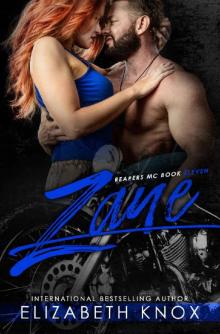 Zane (Reapers MC Book 11)
Zane (Reapers MC Book 11) Hate on Me (Knights of Retribution MC Book 3)
Hate on Me (Knights of Retribution MC Book 3) Web of Lies
Web of Lies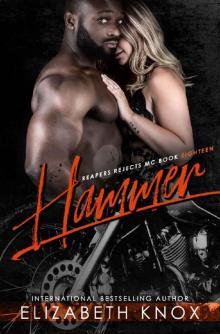 Hammer (Reapers Rejects MC Book 18)
Hammer (Reapers Rejects MC Book 18) Consumed: A Driven World Novel (The Driven World)
Consumed: A Driven World Novel (The Driven World) Anguish
Anguish Frost (Reapers MC Book 15)
Frost (Reapers MC Book 15) Alluring Allies
Alluring Allies Covert (The Clans Book 9)
Covert (The Clans Book 9) No Limits: A Taboo Anthology
No Limits: A Taboo Anthology Malicious: A Nomad Biker Novel (Raiders of Valhalla MC Book 1)
Malicious: A Nomad Biker Novel (Raiders of Valhalla MC Book 1) Venom's Secret (Iron Vex MC Book 4)
Venom's Secret (Iron Vex MC Book 4) Forbidden Love: Book 1 in the Mackenzie Series (Leave Me Breathless World)
Forbidden Love: Book 1 in the Mackenzie Series (Leave Me Breathless World) Twisted Steel: An MC Anthology: Second Edition
Twisted Steel: An MC Anthology: Second Edition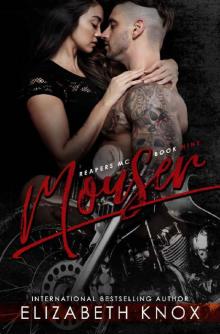 Mouser (Reapers MC Book 9)
Mouser (Reapers MC Book 9) Sharp Edges (Full Throttle Book 2)
Sharp Edges (Full Throttle Book 2) Blackjack
Blackjack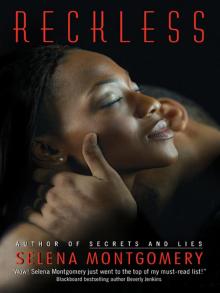 Reckless
Reckless Blood & Torment (Pins and Needles: Moscow Book 2)
Blood & Torment (Pins and Needles: Moscow Book 2) Demise (The Clans Book 13)
Demise (The Clans Book 13)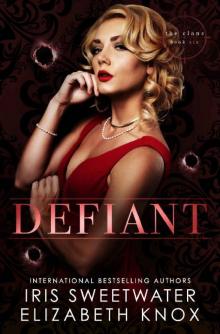 Defiant (The Clans Book 6)
Defiant (The Clans Book 6) Flawed (The Clans Book 12)
Flawed (The Clans Book 12) Amara (Reapers MC Book 12)
Amara (Reapers MC Book 12) Widow (Reapers MC Book 4)
Widow (Reapers MC Book 4)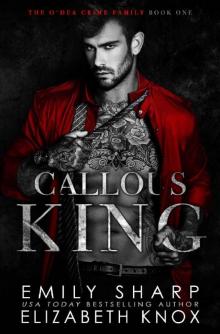 Callous King (The O'Dea Crime Family Book 1)
Callous King (The O'Dea Crime Family Book 1)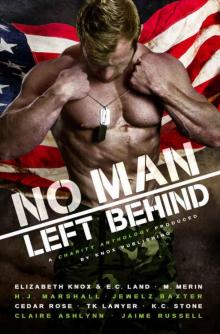 No Man Left Behind: A Veteran Inspired Charity Anthology
No Man Left Behind: A Veteran Inspired Charity Anthology Finley's Adoration
Finley's Adoration Sinister (Raiders of Valhalla MC Book 2)
Sinister (Raiders of Valhalla MC Book 2)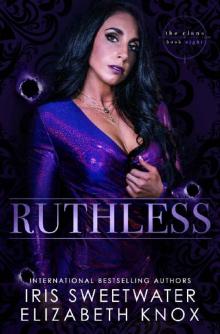 Ruthless (The Clans Book 8)
Ruthless (The Clans Book 8) Filthy Valentine: A Dungeon Demons MC Prequel
Filthy Valentine: A Dungeon Demons MC Prequel Havoc- Reapers MC Boxset
Havoc- Reapers MC Boxset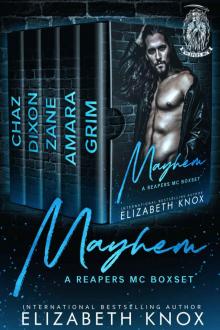 Mayhem: A Reapers MC Boxset
Mayhem: A Reapers MC Boxset The Absolute Book
The Absolute Book Dangerous Love (Mackenzies Book 3)
Dangerous Love (Mackenzies Book 3) Omen's Sign (Iron Vex MC Book 5)
Omen's Sign (Iron Vex MC Book 5) Call My Bluff: A Las Vegas Themed Anthology
Call My Bluff: A Las Vegas Themed Anthology Blood & Agony: A Dark Criminal Romance (Pins and Needles: Moscow Book 1)
Blood & Agony: A Dark Criminal Romance (Pins and Needles: Moscow Book 1) Tough as Steele (Steele Bros Book 1)
Tough as Steele (Steele Bros Book 1) Dixon (Reapers MC Book 10)
Dixon (Reapers MC Book 10) Stripping a Steele (Steele Bros Book 2)
Stripping a Steele (Steele Bros Book 2)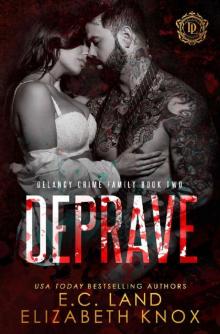 Deprave (DeLancy Crime Family Book 2)
Deprave (DeLancy Crime Family Book 2) Vex's Temptation
Vex's Temptation Stripping a Steele
Stripping a Steele Dreamhunter
Dreamhunter The Trade
The Trade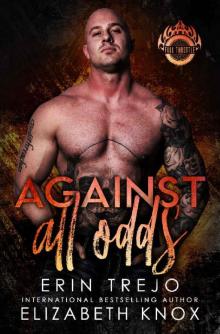 Against All Odds (Full Throttle Book 1)
Against All Odds (Full Throttle Book 1) Call My Bluff
Call My Bluff Sydney's Battle (Reapers Rejects MC: Second Generation Book 1)
Sydney's Battle (Reapers Rejects MC: Second Generation Book 1)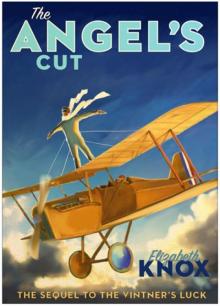 The Angel's Cut
The Angel's Cut Dreamquake
Dreamquake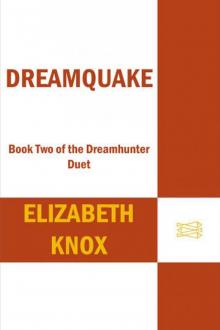 Dreamquake: Book Two of the Dreamhunter Duet
Dreamquake: Book Two of the Dreamhunter Duet Reckoning (Skulls Renegade MC Book 5)
Reckoning (Skulls Renegade MC Book 5)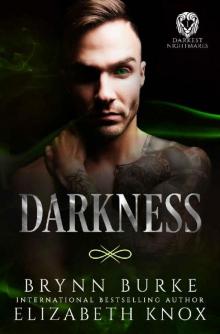 Darkness (Darkest Nightmares Book 1)
Darkness (Darkest Nightmares Book 1) Switched (Sin City Fets Book 1)
Switched (Sin City Fets Book 1)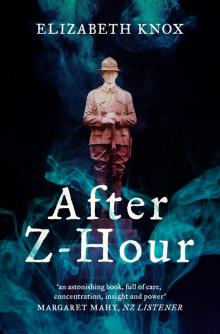 After Z-Hour
After Z-Hour Axel (Reapers MC Book 17)
Axel (Reapers MC Book 17) A Visit to the House on Terminal Hill
A Visit to the House on Terminal Hill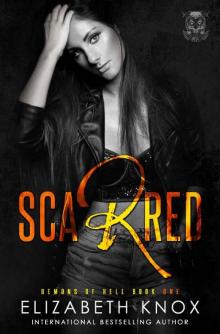 Scarred (Demons of Hell MC Book 1)
Scarred (Demons of Hell MC Book 1) Stolen Hearts: A Dark Billionaire Collection
Stolen Hearts: A Dark Billionaire Collection Promised (The Clans Book 1)
Promised (The Clans Book 1) The Trade (The Clans Book 2)
The Trade (The Clans Book 2) Revenge
Revenge Daylight
Daylight Redemption
Redemption Overzealous Alphas
Overzealous Alphas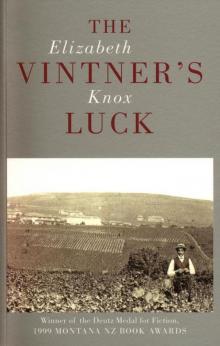 The Vintners Luck
The Vintners Luck Wake
Wake Corrupted Love: A Dark Mafia Romance (Mackenzies Book 2)
Corrupted Love: A Dark Mafia Romance (Mackenzies Book 2) Mortal Fire
Mortal Fire Reckoning
Reckoning Tough as Steele
Tough as Steele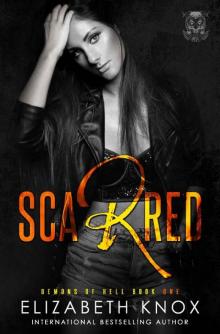 Scarred
Scarred Relentless (Skulls Renegade Book 4)
Relentless (Skulls Renegade Book 4)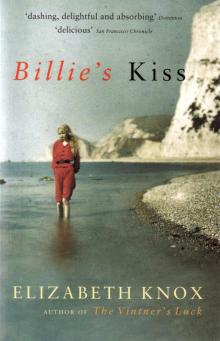 Billie's Kiss
Billie's Kiss Reclaimed (Skulls Renegade MC Book 6)
Reclaimed (Skulls Renegade MC Book 6) Deceptive Love: A Dark Mafia Duet (Mackenzie & Volkolv Book 1)
Deceptive Love: A Dark Mafia Duet (Mackenzie & Volkolv Book 1)